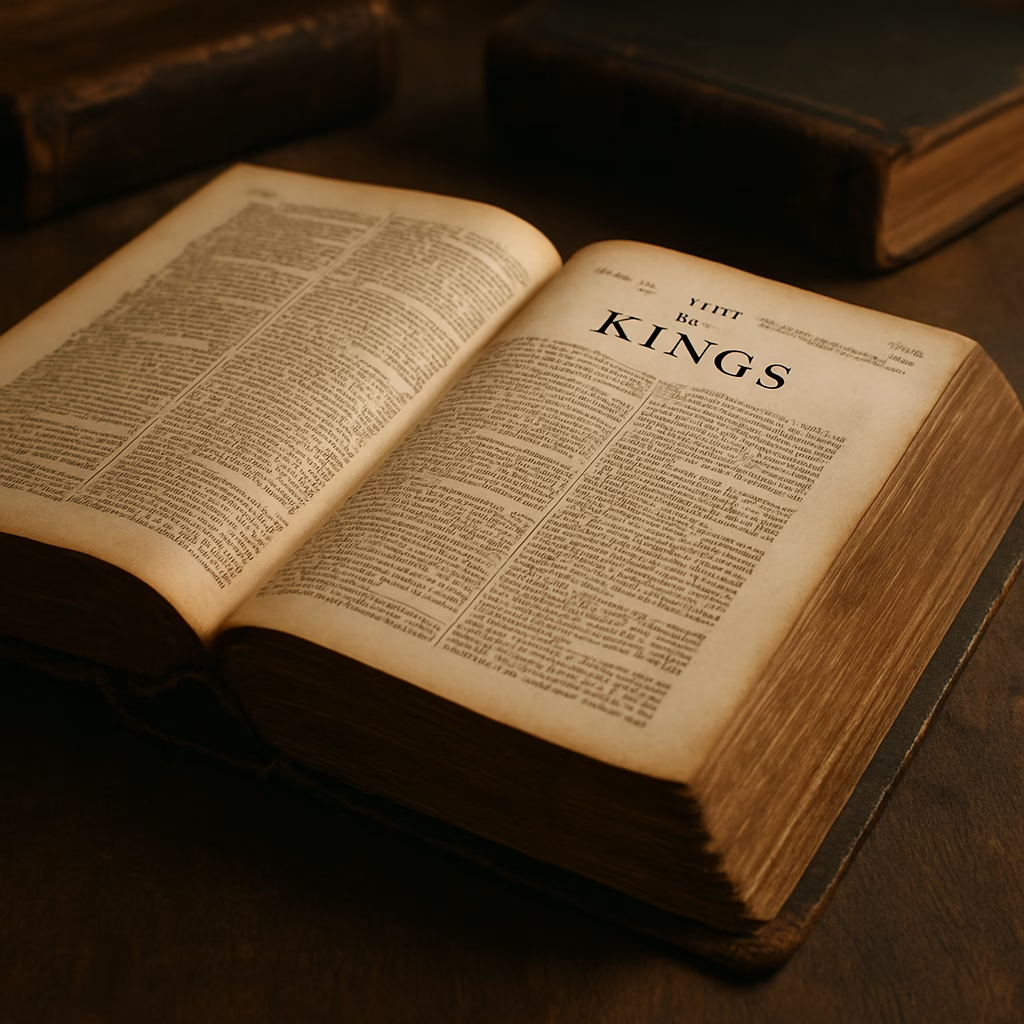A Complete Guide to Its Meaning, History, and Relevance Today
📖 What Is the Book of Kings?
The Book of Kings refers to two books in the Old Testament of the Bible: 1 Kings and 2 Kings. These books provide a detailed historical account of the monarchies of Israel and Judah, spanning from the death of King David to the Babylonian exile.
Together, they form a critical section of the Hebrew Bible’s Deuteronomistic history, a theological narrative extending from Deuteronomy through 2 Kings.
🕰️ Historical Context
- Time Period Covered: ~970 BCE (death of David) to ~586 BCE (fall of Jerusalem)
Key Eras:
- Reign of Solomon
- Division into the Northern Kingdom (Israel) and Southern Kingdom (Judah)
- Rise of powerful prophets like Elijah and Elisha
- Fall of both kingdoms due to idolatry and injustice
🔑 Key Themes in the Book of Kings
1. Covenant Loyalty
The books constantly measure kings by their faithfulness to God’s covenant with Israel. Good kings (like Hezekiah and Josiah) are praised, while most others are condemned.
2. Prophetic Authority
Prophets, not kings, serve as the true voice of God. Figures like Elijah, Elisha, and Isaiah confront corrupt rulers and call the people back to faith.
3. Judgment and Mercy
Despite repeated disobedience, God offers mercy and chances for repentance. Ultimately, however, judgment (in the form of exile) comes to both Israel and Judah.
4. The Temple
Solomon’s construction of the Temple in Jerusalem is a highlight of 1 Kings. The Temple’s destruction in 2 Kings symbolizes the breaking of the covenant.
👑 Major Figures
| Name | Role | Notable For |
|---|---|---|
| Solomon | King of Israel | Built the First Temple; known for wisdom |
| Elijah | Prophet | Confronted King Ahab; taken to heaven in a chariot |
| Elisha | Prophet | Performed miracles; successor of Elijah |
| Hezekiah | King of Judah | Instituted reforms; resisted Assyria |
| Josiah | King of Judah | Rediscovered the Book of the Law; major reforms |
| Ahab | King of Israel | Married Jezebel; opposed by Elijah |
| Nebuchadnezzar | Babylonian King | Conquered Jerusalem and destroyed the Temple |
✝️ The Book of Kings in Christianity
In Christian Bibles, the Books of Kings follow Samuel and precede Chronicles. They are often seen as both historical records and theological reflections, warning against idolatry and emphasizing the importance of obedience to God.
Many Christians read these books during Lent, Advent, or in studies on leadership, prophecy, or the fall of Jerusalem.
📚 Book of Kings vs. Chronicles: What’s the Difference?
While Kings focuses on both Israel and Judah, Chronicles centers mainly on Judah and gives a more optimistic portrayal. Chronicles omits many of the Northern Kingdom’s stories and often reframes events to emphasize Temple worship and Davidic lineage.
💬 Famous Bible Verses from Kings
1 Kings 3:9 – “So give your servant a discerning heart to govern your people…” (Solomon’s prayer for wisdom)
1 Kings 18:21 – “How long will you waver between two opinions? If the Lord is God, follow him!”
2 Kings 2:11 – “…a chariot of fire… separated the two of them, and Elijah went up to heaven in a whirlwind.”
🌍 Modern Relevance of the Book of Kings
🧠 For Thinkers:
A meditation on power, legacy, and ethical leadership.
🙏 For Believers:
A call to faithfulness amid cultural pressure.
🏛️ For Historians:
A glimpse into ancient Israelite politics, religion, and social structure.
📎 Conclusion
The Book of Kings is more than just a chronicle of rulers – it’s a mirror reflecting humanity’s struggles with power, faith, justice, and identity. Whether you are a Bible scholar, a curious reader, or someone searching for spiritual meaning, this ancient text still speaks with urgency and wisdom.







Your platform gives very useful background information for modern day Christians